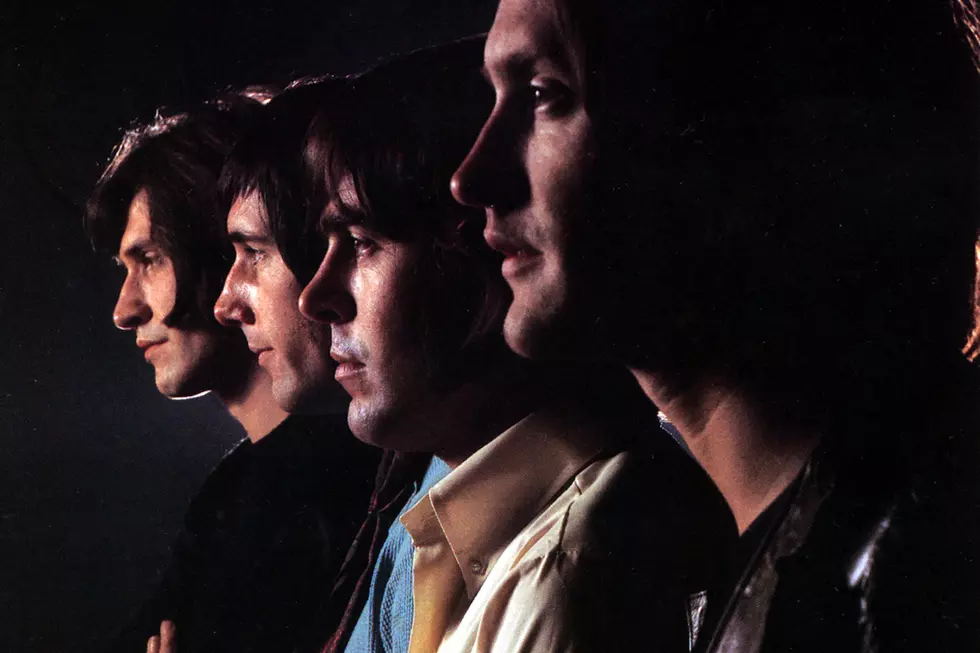
Why the Kinks Embraced Country on ‘Muswell Hillbillies’
The Kinks had a rocky romance with the U.S. After the band’s initial burst of fame in the mid-’60s, they were banned from touring in the States for four years, due to “rowdy” performances. In the ensuing years, the group’s popularity dwindled across the U.S. Audiences struggled to connect with the band’s often specifically English subject matter, and the Kinks couldn’t help matters by promoting their music in concert.
The situation turned after the ban ended in 1969, and the Kinks toured and scored their first U.S. hit in years with “Lola” in 1970. The band soon got dumped from Reprise Records, but were rescued by RCA, who gave the Kinks a big contract and a $1 million advance.
Things were looking up for the Kinks, although frontman Ray Davies couldn’t say the same about Britain. He was dismayed at his country’s political status and bothered by the sense of history that was being lost as new subdivisions were destroying old neighborhoods. Davies witnessed this trend in the northern London suburbs near Muswell Hill where he and his family, including brother and Kinks guitarist Dave Davies, had grown up.
“It’s just very disturbing to see this happen,” Ray told Circus in 1972. “They’re knocking down all the places in Holloway and Islington and moving all the people off to housing projects in new towns.”
The songwriter decided to let his anger and sadness fuel the Kinks’ first RCA album, Muswell Hillbillies, released on Nov. 24, 1971. As the title suggests, Davies conceived the record as a mix of British social commentary and rustic American music styles, including country and bluegrass. He perceived a connection between the music of the downtrodden in the U.S. and the marginalized working class in the U.K.
“Muswell Hillbillies was about real people, real characters in the Davies family,” Dave remembered to Express in 2014. “Ray and I have always been great fans of the likes of Hank Williams and American country music, so [the album] gave us an opportunity to marry up the [idea] of Cockney families moving out to the suburbs and relating it to country music.”
Acoustic instruments, slide guitar, country beats and outdated equipment became the hallmarks of the Kinks’ new album. Lead single “20th Century Man” began with strummed acoustic guitar before turning into a country-rock song in which the nostalgic Ray wondered about his place in modern life. “Here Come the People in Grey” matched a bucolic boogie-woogie with a story about government overreach. The song had its roots in the Davies brothers’ grandmother’s living situation.
Listen to the Kinks' '20th Century Man'
“My gran used to live in Islington in this really nice old house, and they moved her to a block of flats, and she hasn’t got a bath now. She’s got a shower because there isn't room for a bath,” Ray said in 1972. “And like she’s 90 years old, she can’t even get out of the chair let alone stand in the shower. … It’s just a lack of consideration for people. The government people think they are taking them into a wonderful new world but it’s just destroying people.”
Other family and neighborhood friends made appearances in other songs, from Uncle Son (who died from tuberculosis after doing outside labor for the government) to Rosie Rooke (a neighborhood fixture who symbolized a form of excitement for the young musicians). Davies found a way to tie Britain and America, thematically, on the sparse “Oklahoma U.S.A.” On the accordion-drenched tune, he sings of a poor English woman who finds joy in Hollywood escapism and the musical Oklahoma!
On the album’s closing title track, Davies sings of the American music and iconography that inspired him and so many of his fellow British rockers.
Over glistening guitar, he declares: “My heart lies in old West Virginia / Never seen New Orleans, Oklahoma, Tennessee / Still I dream of the Black Hills that I ain't never seen.” While many of Davies’ contemporaries got to see the U.S. on repeated tours, Davies felt he was kept at arm’s length from a country that interested him so much.
“I think a part of me always felt like I should have been brought up in Appalachia,” he admitted to The Guardian in 2013. “People associate me with north London, but I always felt a bit surprised to have been born here somehow. We had this strange thing that because we were banned, there was literally no way of us engaging with America. … I took the ban very personally.”
Critics reacted favorably to Muswell Hillbillies, but it wasn’t a big hit on either side of the Atlantic – especially in contrast to Lola Versus Powerman and the Moneygoround, Part One. Over the decades, however, the album has become a well-respected entry in the Kinks’ chronology, with some even terming it the band’s last great moment.
Both Davies brothers highlighted the album as one of their favorites while doing media availabilities for a deluxe re-release of the LP in 2014 – largely because of how it altered the Kinks’ musical perspective. “Muswell Hillbillies, because of its transformation of the group, was a fine record,” Ray said.
Top 100 '60s Rock Albums
More From 96.1 The Eagle










